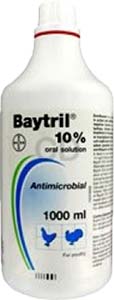Baytril is a broad spectrum antimicrobial antibiotic that is effective against primary and secondary bacterial and mycoplasma pathogens associated with chronic respiratory disease in chickens and turkeys.
 Baytril is not licensed for use in hens producing eggs for human consumption.
Baytril is not licensed for use in hens producing eggs for human consumption.
You can only buy Baytril on prescription from your veterinary surgeon who may decide in the absence of any other licensed products to prescribe it. If this is the case, you will need to follow their advice for egg withdrawal periods.
Be warned, some respected poultry vets are now advising that you should never eat the eggs from hens treated with Baytril because of the problem of antibiotic resistance in humans. It is usually very effective at clearing up respiratory infection in chickens that can be caused by diseases such as Mycoplasma Gallisepticum.
Antibiotic use: Antibiotics kill bacteria that are responsible for the infection although some bacteria survive treatment and go on to create more resistant strains of bacteria. If we get food poisoning, the antibiotics a doctor uses may not work if the bacteria is resistant. In addition to this, antibiotics also kill many of the naturally occurring ‘good’ bacteria that live in the gut. Antibiotics should only be considered as a last resort and always in consultation with your vet.
Please read Antibiotic use in Backyard Poultry.
The following information is about Baytril 10% oral solution. There is also a 2.5% solution.
Used to treat: Chronic Respiratory Disease and Mycoplasma in chickens and turkeys.
Dosage: 10mg per Kg body weight
Active ingredient: Enrofloxacin 10%
Egg withdrawal for chickens: As advised by vet. Usually 28 days or lifetime of the hen.
Slaughtering / meat for human consumption: As advised by your vet. Usually 8 days.
Length of treatment: Usually 3 to 5 days.
Warnings: Mixed solution should not be older than 24 hours. Wash hands and any splashes immediately with soap and water if you come into contact with the solution. Wear impervious gloves when handling Baytril.
Category: POM-V
Storage: In tightly closed original container below 25ºC and out of reach of children.
Further information can be found on NOAH Compendium of Animal Medicines
[note style=”warn” show_icon=”true”]Baytril was banned in the US following concerns of antibiotic resistance in humans. Some vets are now advising that you should never eat eggs again from hens that are treated with Baytril. We strongly advise you to take the advice of your veterinary surgeon before using this product.[/note]
The advice given here is that of the authors and should not be considered as professional advice. Where there is conflicting information, you should always follow the advice of your vet.


